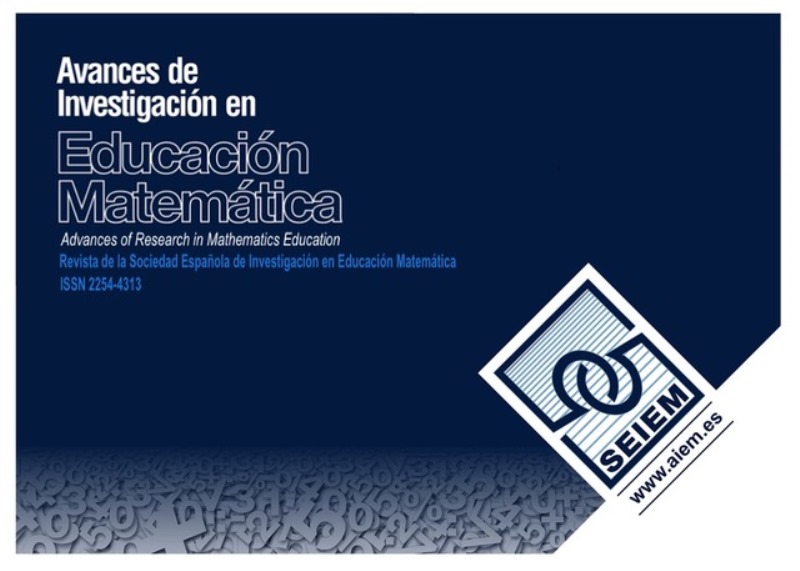Mathematical reasoning in linear systems learning: a higher education exploratory teaching experiment with prospective teachers
DOI:
https://doi.org/10.35763/aiem21.4238Keywords:
Mathematical reasoning, Exploratory teaching, Linear systems equations, Undergraduation in mathematics, Pre-service teacher educationAbstract
Higher education students show difficulties on concepts in linear systems, due to procedural-dominated teaching practices. This emphasizes the need to develop students’ mathematical reasoning using an exploratory teaching approach to promote learning with understanding. This qualitative and interpretative study analyzes the mathematical reasoning that prospective teachers, attending the degree in mathematics, use in solving research tasks involving linear systems, proposed throughout an exploratory teaching experiment and how this context contribute to their learning. Data collection includes participant observation of the teaching experiment classes, and written work of the proposed tasks. The results show that prospective teachers have evolved positively in their understanding and capacity of mathematical reasoning, and in the linear systems learning. The evidenced advantages of this experiment may contribute to a reflection on this integration to improve educational contexts, including preservice teacher education, to overcome their difficulties in learning and develop their knowledge for teaching.
Downloads
References
Albuquerque, C., Veloso, E., Rocha, I., Santos, L., Serrazina, L., & Nápoles, S. (2006). A Matemática na formação inicial de professores. APM e SPCE.
Alencar Filho, E. (1975). Iniciação à Lógica Matemática. Nobel.
Bogdan, R. & Biklen, S. (1994). Investigação qualitativa em educação. Porto Editora.
Boldrini, J. L. (2000). Álgebra Linear. Harbra.
Boston, M. D., & Smith, M. S. (2011). A ‘task-centric approach’ to professional development: Enhancing and sustaining mathematics teachers’ ability to implement cognitively challenging mathematical tasks. ZDM: International Journal of Mathematics Teacher Education, 43, 965-977. https://doi.org/10.1007/s11858-011-0353-2
Breen, S. & O’Shea, A. (2019). Designing mathematical thinking tasks. PRIMUS, 29(1), 9-20. https://doi.org/10.1080/10511970.2017.1396567
Cohen, L., Manion, L., & Morrinson, K. (2007). Research methods in education (6th ed.). Routledge. https://doi.org/10.4236/ahs.2015.44023
Cuesta, A., Escalante, J. E., & Ruíz-Hidalgo, J.F. (2016). Velocidad. Significados manifestados por estudiantes universitarios a partir de representaciones gráficas. Avances de Investigación en Educación Matemática, 9, 105-125. https://doi.org/10.35763/aiem.v0i9.112
Domingos, A. (2003). Compreensão de conceitos matemáticos avançados: A Matemática no inicio do superior. Tese de doutoramento, Universidade Nova de Lisboa, Portugal.
Fonseca, V. & Henriques, A. (2018). A aprendizagem do teorema do valor intermédio numa abordagem exploratória com recurso ao GeoGebra. In A. Pedro, J. Piedade, J. F. Matos, N. Dorotea e N. Pedro (Eds.), Technology Enhanced Learning, Atas do V Congresso Internacional TIC e Educação (pp. 566-576). Lisboa, Portugal. http://ticeduca2018.ie.ulisboa.pt/?page_id=1905
Henriques, A. (2012). O raciocínio matemático na exploração de atividades de investigação: Um estudo com alunos universitários. Quadrante, 21(2), 139-163.
Henriques, A., & Ponte, J. P. (2014). As Representações como Suporte do Raciocínio Matemático dos Alunos quando Exploram Atividades de Investigação. Bolema, 28(48). http://hdl.handle.net/10451/22616
Jeannotte, D. & Kieran, C. (2017). A conceptual model of mathematical reasoning for school mathematics. Educational Studies in Mathematics, 96(1), 1-16. https://doi.org/10.1007/s10649-017-9761-8
Menezes, L., Canavarro, A. P., & Oliveira, H. (2012). Teacher practice in an inquiry-based mathematics classroom. International Journal for Mathematics in Education, 4, 357-362. http://hdl.handle.net/10174/7881
Ministério da Educação. Secretaria da Educação Básica - Brasil (2018). Base Nacional Comum Curricular [BNCC]. Autor.
National Council of Teachers of Mathematics (2000). Principles and standards for school mathematics. NCTM.
Nuramaliyah Ramadhany (2021). Analysis of students' mathematical reasoning abilities during the covid-19 pandemic. In Muh. Yusran Basri, Rezky, A. & Arfah, S. (Eds.), Advances in Social Science, Education and Humanities Research, (vol. 611, pp. 338-342). Atlantis Press. https://doi.org/10.2991/assehr.k.211211.057
Pereira, B. & Mohr, A. (2017). Origem e Contornos da Prática como Componente Curricular. In A. Mohr & H. G. Wielewicki (Orgs.), Prática como componente curricular: que novidade é essa 15 anos depois? (pp. 19-38) NUP/CED/UFSC.
Ponte, J. P. (2005). Gestão curricular em Matemática. In GTI (Ed.), O professor e o desenvolvimento curricular (pp. 11-34). APM
Ponte J. P., Branco N., & Matos, A. (2009). Álgebra no ensino básico. Ministério da Educação, DGIDC.
Ponte, J. P., Mata-Pereira, J., & Henriques, A. (2012). O raciocínio matemático nos alunos do Ensino Básico e do Ensino Superior. Práxis Educativa, 7(2), 355-377.
Ponte, J. P., Quaresma, M., & Mata-Pereira, J. M (2020). Como desenvolver o raciocínio matemático na sala de aula? Educação e Matemática, 56, 7-11.
Possani, E., Trigueros, M., Preciado, J.G., & Lozano, M.D. (2010). Use of models in the teaching of linear algebra. Linear Algebra and its Applications, 432(8), 2125-2140. https://doi.org/10.1016/j.laa.2009.05.004
Souza, M. A. V. F., & Simmer, L. M. (2014). Sistemas Lineares: do Ensino Médio às Engenharias. En Lestón, P. (Ed.), Acta Latinoamericana de Matemática Educativa (pp. 551-560). Comité Latinoamericano de Matemática Educativa.
Stylianides, A. & Stylianides, G. (2007). Learning mathematics with understanding: A critical consideration of the learning principle in the principles and standards for school mathematics. The Mathematics Enthusiast, 4(1), 103-114. https://scholarworks.umt.edu/tme/vol4/iss1/8
Downloads
Published
How to Cite
Issue
Section
License
Copyright (c) 2022 Ana Claudia Correia Batalha Henriques

This work is licensed under a Creative Commons Attribution 4.0 International License.
The articles published in this journal are under a license Creative Commons: By 4.0 España from number 21 (2022).
Authors who publish with this journal agree to the following terms:
- Authors retain copyright and keep the acknowledgement of authorship.
- The texts published in this journal are – unless indicated otherwise – covered by the Creative Commons Attribution 4.0 international licence. You may copy, distribute, transmit and adapt the work, provided you attribute it (authorship, journal name, publisher) in the manner specified by the author(s) or licensor(s). The full text of the licence can be consulted here: http://creativecommons.org/licenses/by-nc/4.0.
- Authors are able to enter into separate, additional contractual arrangements for the non-exclusive distribution of the journal's published version of the work (e.g., post it to an institutional repository or publish it in a book), with an acknowledgement of its initial publication in this journal.
- Authors are permitted and encouraged to post their work online (e.g., in institutional repositories or on their website) prior to and during the submission process, as it can lead to productive exchanges, as well as earlier and greater citation of published work (See The Effect of Open Access).









